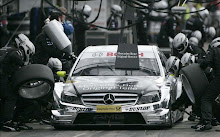




S7 Racing History:
The first S7-R produced by RML was completed in late 2000, then immediately shipped to the United States to make its debut in the American Le Mans Series event at Laguna Seca. Run by Saleen-Allen Speedlab, the car finished in 26th place. For 2001, the first customer chassis would be completed, and their respective teams would enter various championships: Fordahl Motorsports ran in the Grand American Road Racing Championship, RML would run the European Le Mans Series, and Konrad Motorsport would run both ALMS and ELMS.
The S7-R would quickly show its capabilities, when Konrad finished in sixth place at the 12 Hours of Sebring, earning their first class victory. Fordahl would win seven Grand American events en route to finishing second in the class championship, while RML won four ELMS events and won that championship by a mere point over the Konrad Saleens. Saleen-Allen Speedlab would also earn a podium finish at the 24 Hours of Le Mans with an 18th place finish overall.
For 2002, Konrad Motorsport would concentrate mostly on the American Le Mans Series (the ELMS having been dissolved following 2001), while Park Place Racing took over Fordahl's entry in Grand American. Newcomer Graham Nash Motorsport would both the British GT and Spanish GT Championships. Park Place won four races and earned their first championship title, while Graham Nash would win nine British GT and four Spanish GT races, earning them the title in both series. Konrad Motorsport however struggled against a stronger Corvette Racing team and could not score any victories, but were able to finish second in the championship.
Konrad Motorsport chose to move their Saleen squad to Europe in order to compete in the FIA GT Championship in 2003, leaving North America without a full-season competitor for the S7-R as Park Place abandoned the Grand American championship. Graham Nash would join Konrad in FIA GT, earning a sixth place finish in the championship. For 2004, Saleen would have a resurgence of teams as RML returned to run FIA GT, Dominique Dupuy's DDO team entered the FFSA GT Championship, Konrad assisted the new Vitaphone Racing, and ACEMCO Motorsports purchased two brand now S7-Rs, modified to better competed in the American Le Mans Series. Vitaphone would earn three victories in FIA GT en route to a fourth place in the championship, while DDO earned two victories in FFSA GT.
Fortunes would quickly turn for the S7-Rs in the 2005 season. Konrad and Graham Nash would see their racing efforts downsized as the teams hit economic problems. Vitaphone Racing moved on from the S7-R and raced a Maserati MC12 to the FIA GT championship. This left ACEMCO to take second in the American Le Mans Series, while DDO would earn the only Saleen wins that year with three.
In an attempt to rebound from 2005, Saleen chose to concentrate on select series and events. ACEMCO would drop from the American Le Mans Series in order to concentrate solely on entering the 2006 24 Hours of Le Mans where they earned an 11th place finish, the best ever by a Saleen. Oreca would be chosen to built new S7-R chassis with upgrades to make them more competitive, which led to the team earning two victories in the Le Mans Series. In FIA GT, Zakspeed would take over as the factory squad with Balfe Racing running as a privateer. Zakspeed would manage to earn two victories and earn themselves fourth in the championship.
For 2007, Zakspeed was forced to abandon their FIA GT effort as the team went bankrupt during the off-season. ACEMCO also was forced to withdraw and offer their S7-Rs for sale. Oreca would build two more chassis, with one going to the Italian Racing Box squad who would compete alongside Oreca in the Le Mans Series. Oreca would win four races during the season.
















































